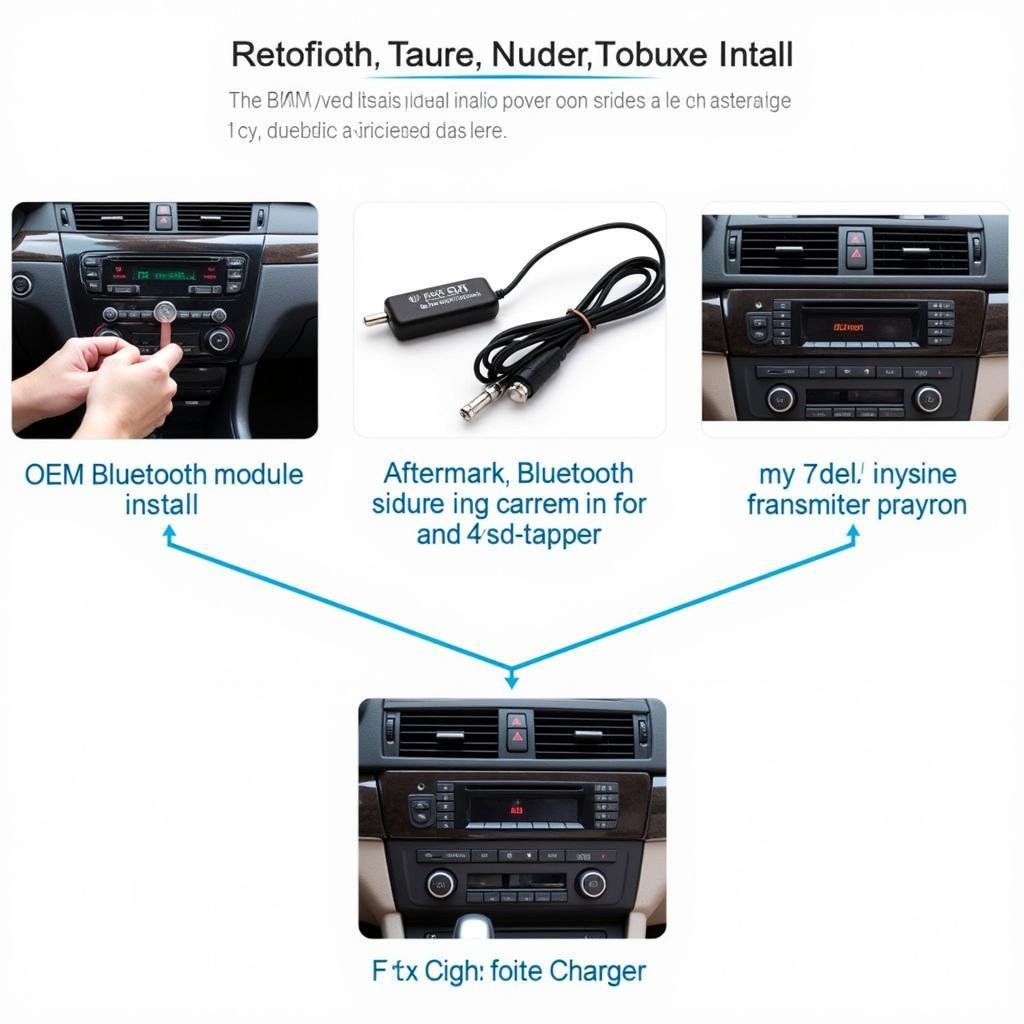Upgrading your BMW with an aftermarket audio system can dramatically improve your driving experience. This guide explores the world of BMW aftermarket audio systems, covering everything from choosing the right components to installation and coding. We’ll delve into the benefits, challenges, and provide practical tips for achieving audiophile-quality sound in your BMW.
Why Choose a BMW Aftermarket Audio System?
Factory-installed BMW audio systems often fall short of expectations, especially for audio enthusiasts. An aftermarket system allows you to customize your sound, achieving superior clarity, deeper bass, and a more immersive listening experience. Upgrading your system also increases the resale value of your vehicle, making it an investment worth considering. You might be interested in an upgrade for your 2016 bmw m4 audio system.
Components of a BMW Aftermarket Audio System
A typical aftermarket audio system consists of several key components:
- Head Unit: The central control hub for your audio system. Modern head units often include features like Apple CarPlay, Android Auto, and navigation.
- Speakers: The drivers that produce the sound. Upgrading to high-quality speakers can make a significant difference in sound clarity and detail.
- Amplifier: Boosts the audio signal to power the speakers, resulting in louder and cleaner sound.
- Subwoofer: Dedicated to reproducing low-frequency sounds, providing deep and powerful bass.
- Sound Deadening: Reduces unwanted vibrations and road noise, allowing you to enjoy your music more fully.
Looking for used parts? Check out used bmw audio parts.
Installation and Coding: DIY or Professional?
Installing a BMW aftermarket audio system can be a complex process, especially with modern BMWs featuring intricate electronics and fiber optic networks. While some enthusiasts might opt for a DIY approach, professional installation is often recommended to ensure proper integration and avoid potential issues.
Coding is often required to ensure compatibility between the aftermarket components and the vehicle’s computer system. This process can involve adjusting settings for speaker impedance, equalizer curves, and other parameters to optimize sound quality. For those considering specific upgrades, resources like information on bmw e90 lci audio upgrade can be invaluable.
How do I choose the right components for my BMW?
Selecting the right components depends on your budget, listening preferences, and the specific model of your BMW. Researching compatible components and consulting with a car audio professional can help you make informed decisions.
 BMW Audio System Installation Process
BMW Audio System Installation Process
Benefits of a BMW Aftermarket Audio System
- Enhanced Sound Quality: Enjoy richer, clearer, and more powerful audio.
- Personalized Listening Experience: Tailor the sound to your preferences with adjustable settings.
- Increased Resale Value: A high-quality audio system can make your BMW more attractive to potential buyers.
- Modern Features: Integrate seamlessly with smartphones and other devices.
Common Challenges and Solutions
- Compatibility Issues: Ensure all components are compatible with your BMW model.
- Coding Challenges: Professional coding might be required for optimal performance.
- Wiring Complexity: Seek professional help if you’re not comfortable with car electronics. If you’re interested in features like Active Sound Design, explore resources on active sound design bmw f30.
What is the average cost of a BMW aftermarket audio system?
The cost can vary significantly depending on the chosen components and the complexity of the installation. A basic system might cost a few hundred dollars, while a high-end system can reach several thousand.
“A properly installed aftermarket audio system can transform your BMW into a concert hall on wheels,” says renowned car audio expert, Michael Stevens. “It’s an investment that significantly enhances the driving experience.”
Conclusion
Upgrading to a BMW aftermarket audio system is a worthwhile investment for any driver seeking a superior listening experience. By carefully selecting components and ensuring professional installation and coding, you can unlock the full audio potential of your BMW. Consider checking out our guide on bmw m3 aftermarket audio for a more specific example.
FAQ
- Do I need to replace all my factory speakers? Not necessarily, you can upgrade individual components as needed.
- Can I install an aftermarket audio system myself? It’s possible, but professional installation is recommended for complex systems.
- Will an aftermarket system void my BMW warranty? It depends on the specific modifications and your warranty terms.
- How long does it take to install an aftermarket audio system? It can take anywhere from a few hours to a full day depending on the complexity of the system.
- What is the best brand for BMW aftermarket audio systems? Several reputable brands offer excellent components, so research is key.
- How can I ensure compatibility with my BMW’s iDrive system? Consult a professional or research compatible components.
- What kind of maintenance is required for an aftermarket audio system? Regular cleaning and occasional checks for loose connections are recommended.
Need Help with Your BMW Aftermarket Audio System?
Contact us via Whatsapp: +1 (641) 206-8880, Email: CARDIAGTECH[email protected] or visit us at 276 Reock St, City of Orange, NJ 07050, United States. Our 24/7 customer support team is ready to assist you.

